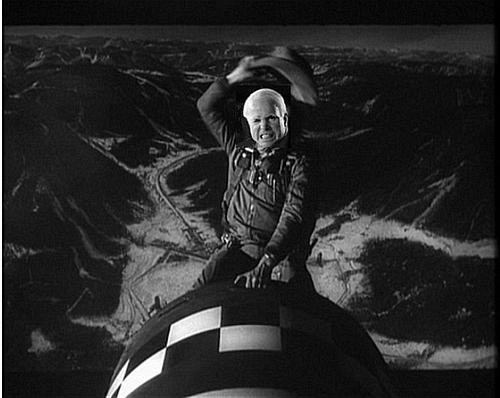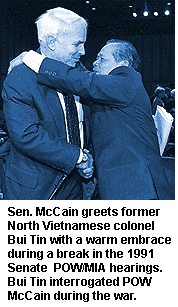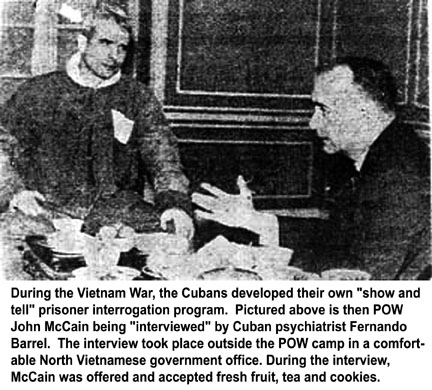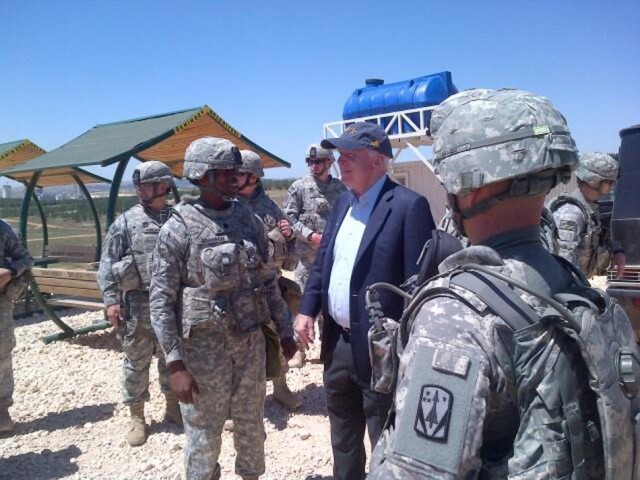

McCain Strangelove
John McCain: War Hero Or War Criminal?
Post Categories: Debate
Philip Giraldi | Friday, May 31, 2013, 15:51 Beijing
Print
Two time Medal of Honor recipient Marine Major General Smedley Butler once said“war is a racket.” He might have added that while enriching the few it victimizes and degrades everyone else who is caught up in the meat grinder, soldiers as well as civilians.
Consider how accounts of soldiers who are captured and subsequently turn on their own country are as old as warfare. American soldiers taken prisoner are only supposed to provide their names, ranks, and serial numbers to their captors though in practice many find themselves agreeing with their interrogators or even signing confessions to avoid abuse or obtain better conditions in their prisons.
A number of American prisoners were described as having been “brainwashed” during the Korean War, the expression initially suggesting that they had been subject to psychological conditioning and indoctrination that made them question their loyalties and which subsequently produced episodes of aberrant behavior.
In some cases the psychological conditioning was combined with physical torture, but in most cases not. In nearly all cases the victims later recanted the confessions they provided to their captors, were despondent over what they had done and said while under North Korean and Chinese control, and sometimes had difficulty in readjusting to life in the United States.
Vietnam also produced its own crop of American prisoners of war, numbering perhaps as many as 2,000 when the Paris peace talks started in 1973. One of them was John McCain, now a reliably hawkish Senator from Arizona who has recently visited Syria in an attempt to jump start a new war in the Middle East.
While it is well known that McCain was a captive of the North Vietnamese for more than five years after his plane was shot down while bombing a power plant, considerably less well known is his behavior while a prisoner of war in Hanoi which has long been the object of some speculation due to allegations of possible cooperation with his captors.

McCain, who was saved from drowning by a Vietnamese civilian and was treated at a Hanoi hospital for his wounds, was the son of the Admiral commanding the Pacific Fleet, so he was what might be referred to as a high value captive for the North Vietnamese regime.

As such he received considerable attention from his captors, was referred to by his fellow prisoners as the “Crown Prince,” and was, by some accounts, handled with kid gloves.
And his connections may have ensured that he would receive additional high value treatment from the Pentagon upon his return to the U.S., he being awarded an astonishing Silver Star, Legion of Merit, Distinguished Flying Cross, Bronze Star and a Purple Heart for his 22 missions spent bombing mostly civilian targets in North Vietnam.

McCain’s own tale of his torture and the confession he recorded for the North Vietnamese comes largely from his book Faith of My Fathers, in which he describes his shame at cooperating with the enemy.
But some of McCain’s fellow prisoners, who were tortured and did not collaborate, have challenged his narrative, expressing their belief that McCain was not physically abused at all and that he was well treated. Others who were also in the prison camp dispute that claim.
But by McCain’s own account he may have begun cooperating with the North Vietnamese within three days of his capture and was fully on board within two weeks, providing specific intelligence on his aircraft carrier, its aircraft, and the support vessels attached to it, information that was later featured in North Vietnamese radio broadcasts.
One account that appeared on a wire service entitled “PW Songbird is Pilot Son of Admiral” reported that McCain may have gone beyond an acceptable level of collaboration in assisting the psychological warfare offensives aimed at American servicemen: “The broadcast was beamed to American servicemen in South Vietnam as a part of a propaganda series attempting to counter charges by U.S. Defense Secretary Melvin Laird that American prisoners are being mistreated in North Vietnam.”
Douglas Valentine, in a 2008 article in Counterpunch, describes how “On one occasion, General Vo Nguyen Giap, the top Vietnamese commander and a nationalist celebrity of the time, personally interviewed McCain. His compliance during this command performance was a moment of affirmation for the Vietnamese. His Vietnamese handlers thereafter used him regularly as prop at meetings with foreign delegations.”
It has also been claimed by retired Army Colonel Earl Hopper, admittedly without any corroborating evidence apart from what might be contained in inaccessible Pentagon files, that
“McCain told his North Vietnamese captors, highly classified information, the most important of which was the package routes, which were routes used to bomb North Vietnam. He gave in detail the altitude they were flying, the direction, if they made a turn… he gave them what primary targets the United States was interested in…the information McCain provided allowed the North Vietnamese to adjust their air-defenses. As result…the US lost sixty percent more aircraft and in 1968 [and] called off the bombing of North Vietnam, because of the information McCain had given to them.”
If McCain indeed collaborated beyond the point that might have been understandable for any prisoner seeking to ameliorate his confinement it would be an intriguing tale, particularly if it could be plausibly demonstrated that it might have influenced his subsequent behavior as a senator cheerleading for the Pentagon while simultaneously covering up some of the more disgraceful by products of Vietnam.
Pulitzer Prize winning journalist Sydney Schanberg, who was intrigued by the Vietnam POW issue, began pursuing the McCain story in the late 1980s. Schanberg, a former senior editor at the New York Times, is best known for his coverage of the war in Vietnam and his book The Killing Fields about Cambodia, which was made into an Oscar winning movie.
Schanberg was unable to find a mainstream paper or magazine interested in the story but he eventually completed a feature article on the Senator and the prisoners in Vietnam entitled “McCain and the POW Cover Up,” which first appeared on the website of The Nation Institute in September 18, 2008. The article was later replayed by The American Conservative in its July 2010 edition, together with critical commentary. ALSO SEE: ALSO SEE ALSO SEE: ALSO SEE:
Schanberg makes two key points: first that a number of American prisoners of war were left behind in Indochina in 1973 with the connivance of top levels in the U.S. government and second that John McCain has worked assiduously to obstruct any efforts to open Pentagon files and follow up on leads to determine the status of the POWs and the “missing in action.”
Admittedly, the prisoner of war issue is considerably more complicated than Schanberg represents it to be with many of the sightings and other evidence subject to challenge while his assumption that the Vietnamese were interested in exchanging their remaining prisoners for U.S. financial assistance is also somewhat speculative.
But it appears undeniable based on the statements of senior U.S. government officials cited in the article and accompanying commentary that at least some prisoners were left behind with the full knowledge of and even enablement by the White House and Congress.
Numerous elected and appointed officials subsequently lied to cover up their mendacity. It was a national disgrace, compounded through the fully documented case Schanberg makes for subsequent obstructionism by McCain and a number of other Senators who followed his lead, including current Secretary of State John Kerry, to impede any serious search for the missing in action and POWs.
One might reasonably infer that McCain’s cover up of Vietnam era POW sightings could well have been driven by fear that some released prisoners might have unpleasant things to say about his activities while at Hoa Lo prison.
But as the war is now long over and any remaining prisoners are surely dead, none of this would matter a great deal today realistically speaking except to the remaining POW families.
But the past does shape the present and character surely does matter, particularly if one wants to become president and have the authority to send American soldiers to their deaths in support of questionable interventionist policies that might be rooted in a psychological need to fix what went wrong in Vietnam.
the past does shape the present and character surely does matter, particularly if one wants to become president and have the authority to send American soldiers to their deaths in support of questionable interventionist policies that might be rooted in a psychological need to fix what went wrong in Vietnam.
Though no longer a presidential candidate, John McCain is still a powerful voice in the Senate consistently advocating policies calling for the United States to use military force around the world.
He is a reliable hawk who contrary to all the evidence continues to embrace the Iraq fiasco as if it were an American triumph and who is now the most active senator agitating for direct U.S. military action against Syria and Iran. His recent visit to Syria to demonstrate support for the rebels is, in fact, a violation of the Logan Act which forbids the conduct of foreign policy by anyone outside the executive branch of government.
More troubling perhaps, McCain has consistently and irrationally advocated an undeviating hard line against Russia, the only country with the military capability to confront and destroy much of the United States through its nuclear armed ballistic missile forces.
McCain supports untouchable defense budgets, American Exceptionalism, and a proactive “defense” policy that is a holdover from the George W. Bush years. He constantly flouts his patriotism and war record, which have become essential parts of his political persona, and he might well be reasonably described as the leading advocate of militarism in the United States Senate.
Much of McCain’s chauvinistic bluster might indeed be explained by guilt over his long ago confession to the North Vietnamese, a failing for which he might be making atonement through doubling down to demonstrate his unwavering support of the military.
And there is also a darker side to him, possibly fed by guilt, evident in his frequently observed volcanic temper, which has been sometimes been directed against families of former prisoners who have raised the POW issue. It has been plausibly described as the side of a man who is not at peace with himself.
So who is the real John McCain? A credible case has been made that McCain may have crossed the line and collaborated extensively while a prisoner in North Vietnam. His subsequent actions to block any inquiry into the status of possible POWs have also been examined in some detail and quite reasonably questioned.
Many journalists and former government officials have long been aware of McCain’s possible misrepresentation of his deportment in Hanoi even if the story has not exactly made the front pages.
The Pentagon reportedly has recordings of McCain’s radio broadcasts, which could be released if the Senator allows the Department of Defense to do so. And there would also been an intensive intelligence debriefing after the return to the United States, an unredacted version of which has never been produced.
If the recordings were truly limited to an under duress script fabricated to satisfy McCain’s tormentors, as he states in his book, they would only have reinforced the image of war hero, so it raises the question of why that was not done in 2008 or when McCain made his first run for the presidency in 2000.
The president of the United States has his finger on the nuclear trigger, surely making his mental state and possible betrayal of his comrades while in military service legitimate lines of inquiry. The documents relating to McCain in the Pentagon archives would reveal one way or the other at least some of the truth about the man.
There are a number of possible reasons for the unwillingness within the media and among the public to seek the truth about John McCain, also noted most recently in the broader reluctance to confront the legacy of the war against Iraq on the tenth anniversary of the invasion.
No one likes to reopen old wounds, particularly since both Vietnam and Iraq were wars fought on lies and both are now widely viewed as major policy disasters.
And in post-9/11 America, government secrecy has created a situation in which information can easily be managed to both protect and benefit those in the White House and in Congress while embedded journalists increasingly become part of the story as they integrate seamlessly with policy makers.
This groupthink is largely driven by the intangible beltway consensus about the underlying American myth of “we are the good guys” that the public is inclined to support in an age when the country is falsely and deliberately perceived as drowning in a sea of terrorists and ungrateful foreigners.
Confidence in America’s public institutions can be criticized but must not be seriously damaged so there is a well understood line that must not be crossed.
If one were to read about a war hero Senator who turns out to be considerably less than that and who did his best to block the return of American prisoners it would undermine confidence in government and just might call into question the legitimacy of America’s wars since 1945.
But it is perhaps not too late to take another look at McCain and the post-Vietnam POW issue while many veterans of that conflict are still alive. It might also help to discredit the Senate’s leading warmonger. Either way, it would be a reckoning that is long since overdue.
Philip Giraldi, a former CIA officer, is a contributing editor to The American Conservative and executive director of the Council for the National Interest.
http://www.informationclearinghouse.info/article35132.htm
This article was originally published at Antiwar
See also
McCain crosses paths with rebel kidnapper: U.S. Senator John McCain was photographed with a known affiliate of the rebel group responsible for the kidnapping of 11 Lebanese Shiite pilgrims one year ago, during a brief and highly publicized visit inside Syria this week.
Humor – Family Concerned After John McCain Wanders Into Syria: Members of Sen. John McCain’s family expressed deep concern Tuesday after receiving word that the aging legislator had wandered off into Syria. “Unfortunately, this has been happening a lot lately; he’ll walk out of the Capitol building, get disoriented, and then we get a call late at night saying that John is in Syria,” McCain’s wife Cindy said
THE REAL MCCAINE

How war hero John McCain betrayed the Vietnamese peasant who saved his life
–
Last updated at 01:10am on 23rd March 2008
–
Comments In all the tales of wartime courage peppering John McCain’s presidential campaign trail, perhaps the most outstanding example of selfless heroism involves not the candidate but a humble Vietnamese peasant.
–
On October 26, 1967, Mai Van On ran from the safety of a bomb shelter at the height of an air raid and swam out into the lake where Lieutenant Commander McCain was drowning, tangled in his parachute cord after ejecting when his Skyhawk bomber was hit by a missile.
–
In an extraordinary act of compassion at a time when Vietnamese citizens were being killed by US aerial bombardments, he pulled a barely conscious McCain to the lake surface and, with the help of a neighbour, dragged him towards the shore.
–
Reunited: Senator McCain and his Vietnamese rescuer Mai Van On in Hanoi in 1996
–
And when a furious mob at the water’s edge began to beat and stab the captured pilot, Mr On drove them back.
–
Nearly three decades later, a Vietnamese government commission confirmed he was indeed the rescuer and, in a 1996 meeting in Hanoi, McCain embraced and thanked Mr On and presented him with a Senate memento.
–
From that brief encounter to his death at the age of 88 two years ago, Mr On never heard from the senator again, and three years after their meeting, McCain published an autobiography that makes no mention of his apparent debt to Mr On.
–
It is a snub Mr On took to his death.
–
His widow, Bui Thi Lien, 71, said: “In his last years, my husband was very sad sometimes.
He would say, ‘Mr McCain has forgotten me.’
–
”Mr McCain would be dead if it weren’t for my husband. He would never have returned to his family and he wouldn’t be in the presidential race today.”
–
Last week on a visit to Britain to meet Gordon Brown, McCain paid tribute to the role played by British troops in Iraq and Afghanistan – comments that carried extra weight in the light of McCain’s own wartime exploits.
–
In his 1999 autobiography, Faith Of My Fathers, which laid the ground for his first, unsuccessful run for president in 2000, McCain wrote a Boy’s Own-style narrative of his rescue: “When I came to, I was being hauled ashore on two bamboo poles.
–
To the rescue: John McCain, lying on his back across a bamboo log, is saved by villagers – including Mai Van On – after his jet was shot down in 1967
–
“A crowd of several hundred Vietnamese gathered around me as I lay dazed before them, shouting wildly at me, stripping my clothes off, spitting on me, kicking and striking me repeatedly.”
–
What followed, according to McCain, was five-and-a-half years of torture and brutal beatings as a prisoner of war – an account that has given a steely edge to his candidacy by establishing him as a true American war hero.
–
But the story is at odds with the version uncovered by Vietnam veteran Chuck Searcy, who lives in Hanoi and is in charge of the Vietnam Veteran Memorial Fund.
–
“In 1995, Mr On gave me a letter he wanted me to deliver to McCain,” said Searcy.
–
“’It said, ‘I am the guy who pulled you out of the lake and I have followed your progress over the years. I wish the best for you and your family and I hope some day you will be president of the United States.’
–
“I thought it was endearing. I sent the letter to McCain’s office and I got back a sniffy response from some assistant saying, ‘Mr McCain isn’t interested in these fanciful stories.’“
–
Republican candidate John McCain met French President Nicholas Sarkozy this week Indeed, claiming to have saved McCain had by then become something of a cottage industry in Hanoi.
Searcy, 63, recalled: “There had been a lot of preposterous claims, but I asked the neighbours around the lake if it was true and they said that was exactly how it happened.”
–
The story was also confirmed by the Vietnamese government.
–
Later in 1995, Searcy met McCain at a veterans’ reunion in Washington. He said: “I mentioned the story of Mr On to him, and told him it was true. He said, ‘Hell, I would like to meet this guy – I’ll set it up.’“
–
McCain, then a senator closely involved in rebuilding US-Vietnam relations, visited Hanoi in 1996, and a meeting was arranged with Searcy and Mr On. Searcy said: “Mr On was a wiry little guy. He looked as if he had only ever shaved once or twice and he had his old uniform on.
–
“He raced up to McCain and kept repeating his name as he embraced him.”
–
Then, through an interpreter, Mr On recounted the events of that day as McCain listened.
–
“He launched into a very emotional description,” said Searcy.
–
“Suddenly they saw this parachute coming down into their small lake.
–
“Everybody was afraid because they knew it was an American pilot and they didn’t know what to do.
–
“He said he just instinctively grabbed this big bamboo log and threw it into the water and jumped in after it.
–
“One of his neighbours joined him and the two of them swam out to the parachute.
–
”Apparently McCain had broken both arms and one leg, and had sunk to the bottom, but they pulled him out of the lake.
–
“When they got to the bank, a couple of men attacked McCain, breaking his shoulder with a rifle butt and stabbing his leg, before Mr On stopped them.
–
”That day, he saved McCain from drowning and then from maybe being killed by the mob.
–
“McCain listened but there was no dramatic response. He just nodded, said, ‘Thank you very much,’ and gave Mr On a little Senate seal.
–
“It was the kind of thing you buy in the souvenir shop in the Senate basement.
–
“But Mr On, to the day he died, treated it as if it were a Congressional Medal of Honour.”
–
But although McCain appeared to believe the story, it was one he would later seem to ignore in his autobiography and there was no more contact between the two men.
–
When Mr On died in 2006, an email was apparently sent to McCain’s office requesting a message of condolence for the family. There was no response.
–
Whether or not McCain believed Mr On is unclear.
–
But his refusal to acknowledge his heroism is likely to fuel other, more damaging allegations that McCain exaggerated elements of his PoW ordeal in Hoa Lo prison.
–
Phung Van Chung, 70, who was a Communist Party official at the time, claims McCain was quickly singled out for softer treatment, adding: “I found out he was the son of an American admiral, so the top people wanted to keep him as a live witness so they could use him for negotiations.”
–
Mr On’s son-in-law, Nguyen Ngoc Toan, said: “Before he died, he told us not to sell the medal McCain gave him.
–
He said, ‘If any of the grandchildren ever go to America, having it might help them.’“
–
In 2000, McCain, by then a presidential candidate, visited the lake that almost claimed his life.
–
“His entourage was outside our house but Mr McCain just passed by,” said Mr On’s widow, who insists she bears no grudge.
–
Behind her calm words, however, lies an anxiety to right the injustice she feels her husband suffered.
–
As we prepared to leave she clutched my hand and said: “Please help us to remind Mr McCain what my husband did.
–
”Just a few words will be enough to let the family know that he is grateful.”
–
Additional reporting: William Lowther, in Washington
–
John McCain’s Vietnam jailer backs him
From correspondents in London
June 24, 2008 08:26am
Article from: Agence France-Presse
Send this article: Print Email
REPUBLICAN US presidential candidate John McCain has got some unexpected support from his former Vietnam War jailer, who said he would vote for the former navy pilot if he could.
–
Speaking to the BBC from Haiphong, Tran Trong Duyet also insisted that Senator McCain’s assertions that he was tortured during his time at the prison were lies, and that no one held there was ever subjected to torture.
–
Describing Senator McCain as his “friend”, Mr Duyet told the broadcaster: “If I was American, I would vote for him”.
–
The 71-year-old Arizona senator was shot down over Hanoi in 1967 and jailed for 5½ years, mostly in the infamous “Hanoi Hilton”.
–
“I don’t know how he’d react if he met me again,” Mr Duyet said on the BBC.
–
“We used to argue about the war – about whether it was right or wrong … He is a very frank man – very conservative, and very loyal to his country and the American ideal.
–
“He had a very interesting accent and sometimes he taught me words in English and corrected my accent. I have followed his career since he left prison,” said Mr Duyet, who the BBC said was now a 75-year-old retiree and amateur ballroom dancer.
–
“Of course the Americans started the war in Vietnam and killed so many people – but now we want to leave the past behind.
–
“So now I consider John McCain my friend because he did much to mend relations between our two countries. And if he becomes president he will do more to improve those ties.”
–
He also said Senator McCain’s assertions that he was tortured were false.
–
“We never tortured him,” he was quoted as saying.
–
“We never tortured any prisoners … He did not tell the truth. But I can somehow sympathise with him. He lies to American voters in order to get their support for his presidential election.”

